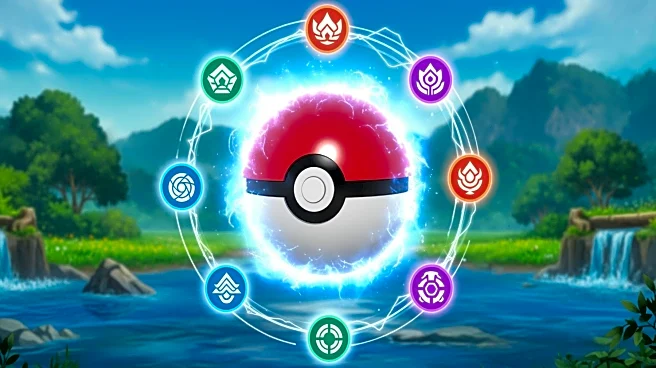What's Happening?
The Pokémon franchise, a collaboration between Nintendo, Game Freak, and Creatures, continues to evolve with new features for player characters across various games. The franchise, which began in 1996
with Pokémon Red and Green, has expanded to include video games, trading card games, mobile apps, and television shows. Player characters, central to the plot of most Pokémon games, are avatars representing real players in the game world. These characters, known for their silent demeanor, embark on journeys as Pokémon Trainers, starting with a first partner Pokémon and aiming to conquer the Pokémon League. Recent developments include the ability to choose character gender, engage in side quests, and participate in minigames. Notably, Pokémon: Let's Go, Pikachu! and Let's Go, Eevee! allow players to control Pokémon directly for specific tasks, enhancing gameplay dynamics.
Why It's Important?
The continuous expansion and enhancement of player character features in Pokémon games reflect the franchise's commitment to engaging its audience with diverse and immersive experiences. By allowing players to choose gender and control Pokémon directly, the games cater to a broader demographic, promoting inclusivity and personalization. These developments not only enrich the gaming experience but also strengthen the franchise's position in the competitive gaming industry. As Pokémon games evolve, they attract new players while retaining long-time fans, ensuring sustained popularity and commercial success. The franchise's ability to innovate and adapt to player preferences is crucial for maintaining its relevance in the rapidly changing entertainment landscape.
What's Next?
Future updates and expansions in the Pokémon franchise are likely to continue focusing on enhancing player engagement and personalization. As technology advances, players can expect more interactive and immersive experiences, possibly incorporating augmented reality or virtual reality elements. The franchise may also explore new narrative directions, introducing complex storylines and character development to deepen player involvement. Additionally, collaborations with other media platforms could expand the franchise's reach, integrating Pokémon characters into broader entertainment ecosystems. These potential developments will aim to keep the franchise at the forefront of the gaming industry, appealing to both existing fans and new audiences.
Beyond the Headlines
The evolution of player character features in Pokémon games highlights broader cultural and ethical considerations in gaming. The emphasis on inclusivity and personalization reflects societal shifts towards diversity and representation in media. As games become more interactive, they raise questions about the impact of virtual experiences on real-world behavior and social interactions. The franchise's approach to character development and storytelling may influence industry standards, encouraging other game developers to prioritize player agency and narrative depth. These trends underscore the role of gaming as a cultural force, shaping perceptions and values in contemporary society.









